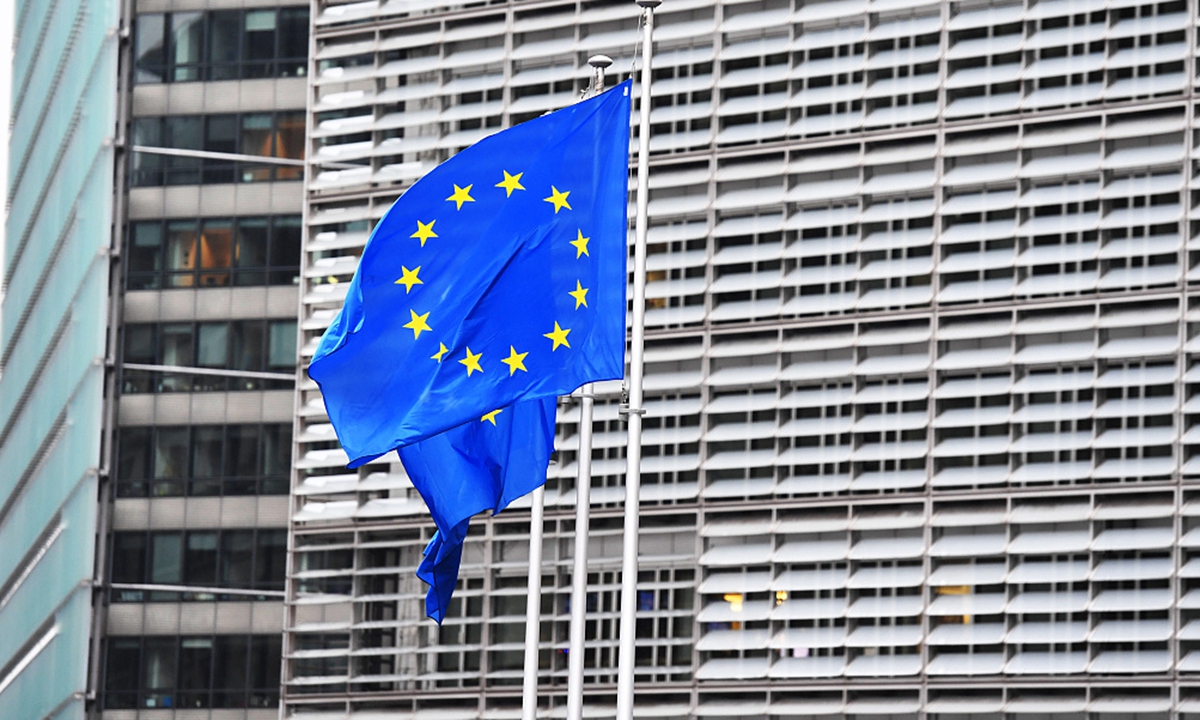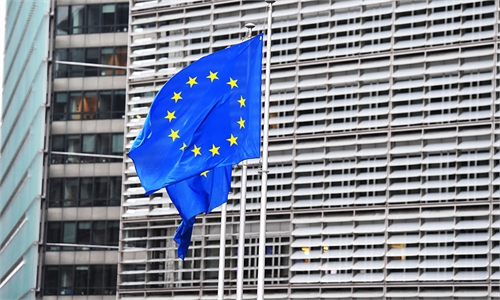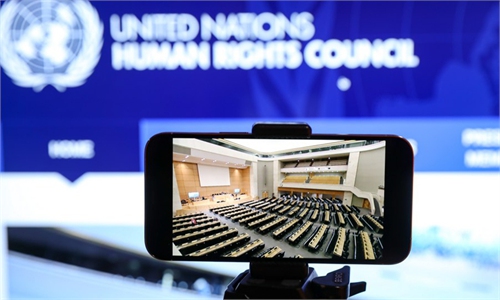China hits back at EU sanctions over Xinjiang affairs, sending strong signal urging foreign countries to stop meddling in its internal affairs
Beijing imposes extensive measures, sending strong signal urging foreign countries to stop meddling in its internal affairs

Photo:VCG
Shortly after European Union foreign ministers signed off on a slate of punitive measures on Monday over alleged human rights abuses, including sanctions directed at China, China hit back with tit-for-tat countermeasures by sanctioning 10 individuals and four entities that have spread rumors and lies about Xinjiang.The Council of the European Union announced on Monday to impose restrictive measures on four Chinese nationals and one entity, as a reaction to the alleged mistreatment by China of its minority Uygur population in Northwest China's Xinjiang Uygur Autonomous Region, including some senior officials of the 13th People's Congress of the Xinjiang Uygur Autonomous Region and of the Xinjiang Production and Construction Corps.
This marks the EU's first ever sanctions against China in 30 years, a move observers say will deal a heavy blow to bilateral relations between the two sides.
After seeing Chinese and US senior officials' exchange of blunt words in Alaska last week, and China's retort against US accusations on issues such as Xinjiang and Hong Kong, the EU should learn its lesson on how to deal with China, warned Chinese experts, noting that Beijing is not afraid of a sanction-wielding Washington, not to mention a much weaker Brussels.
In response to the EU move, the Chinese government sanctioned 10 individuals including Reinhard Bütikofer, chair of the European Parliament's delegation for relations with China, and Michael Gahler, chair of the European Parliament-Taiwan Friendship Group, in addition to some members of the European Parliament affiliated with the parliaments of EU member countries such as Germany, Belgium, Lithuania and the Netherlands.
German scholar Adrian Zenz, an infamous anti-China pseudo-researcher, who has been spreading rumors about Xinjiang and stepping up a disinformation campaign against China, as well as some other think tanks engaged in the disinformation campaign, have also been put on China's sanction list.
Sources close to the matter told the Global Times over the weekend that the Chinese government is formulating countermeasures against the EU. Some EU institutions that have been spearheading the accusations against China's Xinjiang policies will bear the brunt of the countermeasures, and some individuals in EU countries who have behaved badly will not escape punishment, so do some high-profile individuals who frequently bash China on its Xinjiang affairs, for example, Bütikofer.
Bütikofer has frequently and groundlessly criticized China and obstructed the China-EU investment agreement, using China's handling of the Xinjiang and Hong Kong affairs as his excuse.
The individuals concerned and their families are prohibited from entering the Chinese mainland, Hong Kong and Macao, according to the Chinese authorities. And the companies and institutions associated with them are also restricted from doing business with China.
Entities including the Political and Security Committee of the Council of the European Union, Subcommittee on Human Rights of the European Parliament, the Mercator Institute for China Studies in Germany, and the Alliance of Democracies Foundation in Denmark were also sanctioned by the Chinese government.
The number of individuals and entities that China has put onto the sanction list has far outnumbered those of the EU, which showed China's resolute determination of defending its core interests and unswervingly fighting against the disinformation and smear campaign concerning China's policies and internal affairs, according to Chinese experts.
Compared with the previous sanctions imposed by Europe, China's sanctions are stronger and more extensive, at least in terms of the scope of the sanctioned subjects, Cui Hongjian, director of the Department of European Studies at the China Institute of International Studies, told the Global Times Monday.
The list expands from the key figures who have been challenging China over the Xinjiang affairs to those within the EU who have been repeatedly interfering in China's human rights in various ways for a long time. Some of them don't have a direct say on Xinjiang, but have repeatedly challenged China on human rights, Cui said.
The sanctions are intended to send a strong warning signal to the EU, urging it to stop interfering in China's internal affairs, and not only on Xinjiang-related issues, Cui stressed.
Wang Jiang, an associate research fellow at the Institute of Law under the Chinese Academy of Social Sciences, told the Global Times on Monday that in addition to the countermeasures, China will also use the legal tools to defend the legitimate rights of Chinese individuals and entities.
It is also possible that the relevant Chinese entities and individuals will sue those people promoting the sanction measures, just as Xinjiang residents had brought rumormonger Adrian Zenz into the courtroom for reputational and economic losses, and local legal authorities in Europe will have to handle those civil litigations.
Once legal procedures are underway, the defendant will have to bring up proof, which will demonstrate that those so-called sanctions over Xinjiang affairs are based on rumors, making it hard to go forward.
Meanwhile, the National People's Congress, China's top legislature, has already said that it will accelerate its work on laws against external sanctions, interference and long-arm jurisdiction, which would also be helpful in fighting against the unjustified application of foreign laws and sanction measures against Chinese officials and individuals, according to Wang.
China can learn from Russia in countering foreign sanctions, such as granting the head of state the authority to allocate administrative resources in fighting those sanctions and protecting its citizens and companies, and also by accelerating the relevant anti-sanction legislature formulation, he said.
Overestimated EU
Human rights issues have always been the trigger point in relations, and have even led to squabbles between China and the EU, or specific European countries. For example, the bloc has frequently fired criticism against China's handling of the Hong Kong affairs, which was then countered with a fierce backlash from China.
Now, feeling left behind, the EU wants to highlight its political existence by pressing for sanctions over "human rights issues" against both China and Russia, as it perceives human rights as a weapon it can wield to get involved in the competition between superpowers, said Cui. He added that the bloc perceives human rights as its cheap weapon, as it doesn't have the financial and military power that Washington does.
But the EU's arrogance has blinded it to the fact that it is in no position to point fingers at China's human rights development, as it has also become bogged down in serious human rights crises, such as the treatment of Muslims in their own countries, and its poor response to the COVID-19 pandemic.
The German Nazis conducted a large-scale planned massacre of Jews during World War II and 6 million died in the Holocaust; German colonists in 1904 slaughtered numerous Namibians to crack down on a people's uprising and killed more than 100,000 natives as of 1908. Other European countries also had infamous misdeeds in their colonial histories.
On March 2, the bloc imposed sanctions against four Russian officials over the sentencing of opposition figure Alexey Navalny, marking the first time the bloc used its Global Human Rights Sanctions Regime, which was adopted in 2020. The US also triggered similar sanctions the same day.
The EU has followed the US in weaponizing human right issues, and is afraid that issuing punitive measures at Beijing by itself will seriously backfire against Brussels, said Cui, noting that the EU hopes that following Washington will somehow give itself more protection from Beijing's response.
Over the past weekend, the world's attention was fixed on the Alaska meeting between senior diplomats from China and the US, who wrapped up their first face-to-face meeting under the Biden administration. During the meeting, the US side also raised questions such as Xinjiang and Hong Kong to attack China.
Yang Jiechi, a member of the Political Bureau of the Communist Party of China Central Committee and director of the Office of the Central Leading Group for Foreign Affairs, rebuked the US as not being qualified to speak to China from a position of strength. Yang lashed out at the US, saying it also has many human rights issues, and should mind its own business first.
By following the US' suit, the EU has forgotten one thing: The tit-for-tat contest between China and the US is a result of serious consideration, and any possible result will make the world quiver with its consequences, said Cui.
"Beijing won't consider so many consequences in taking countermeasures against the EU, and the bloc will suffer much more pains, at a much higher cost if China makes a move," Cui warned.
Experts warned that the EU's current international status does not allow it to perform opportunism; and it seems that it has forgot shepherding EU countries, such as Germany and France, and certain medium-sized countries, crawling back to fix relations with China, after they learned their lessons by playing the "human rights" card with China.
Europe needs to uphold an independent diplomacy and prioritize the economy and trade, instead of downgrading itself as the US' appendage, like Japan has done.





